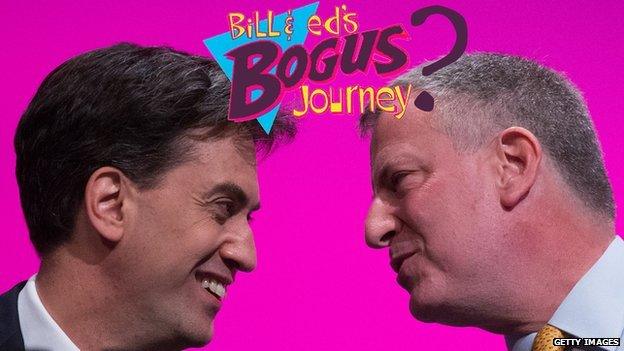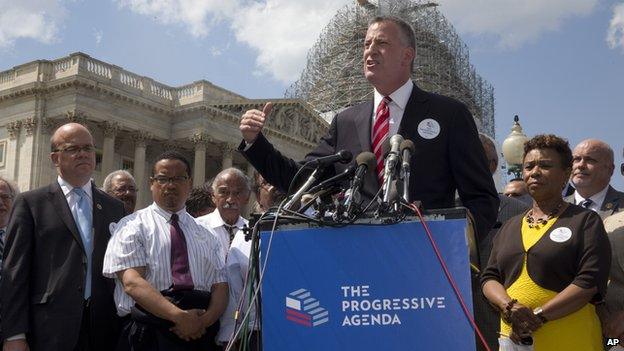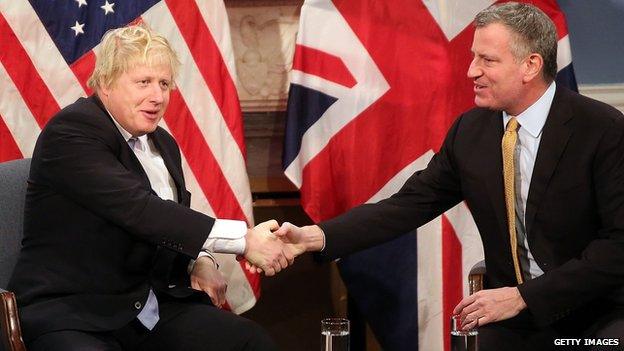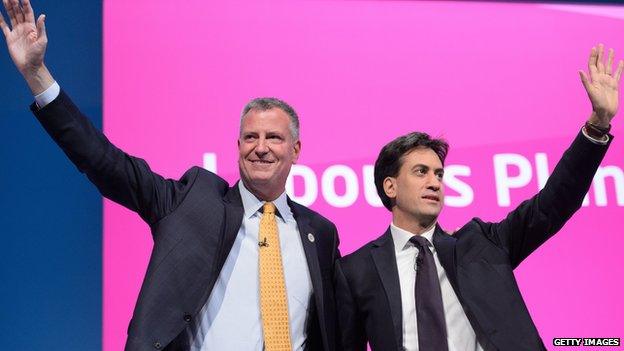Has Bill & Ed's progressive 'excellent adventure' gone awry?
- Published

New York Mayor Bill De Blasio is taking his plans for a progressive agenda on an excellent adventure across the US.
But could attempts to cast himself as the champion of the left end up being a bogus journey? There's a man on the other side of the Atlantic who might just serve as a cautionary tale for the ambitious mayor.
On Tuesday Mr De Blasio made one of his highest-profile stops yet - in Washington, DC, where he appeared alongside the populist darling of the US Senate, Elizabeth Warren, and later unveiled a liberal "Contract With America" on the steps of the US Capitol.
The mayor is calling for a laundry list of reforms, including a $15 minimum wage, universal pre-kindergarten, paid family leave, Wall Street regulation, higher taxes on the wealthy, immigration reform and a "mansion tax" on expensive homes.

If the last one sounds familiar, that's because it was a central component of UK Labour Party leader Ed Miliband's campaign manifesto. So was beefed-up bank regulations and increases in social safety net spending.
Mr Miliband's bid to be the next British prime minister, one might recall, ended in an unceremonious and unexpectedly crushing defeat last week. In the days after the election, his party has been rife with second-guessing and fraternal finger-pointing - most particularly about whether Mr Miliband's brand of full-throated liberalism pushed his party too far outside the political mainstream and opened the door for his political demise.
"He was told that in order to win he had to anchor his party firmly in the political centre," writes Dan Hodges, a former Labour Party official, in the Telegraph, external. "Instead, he decided to position it where it felt most comfortable, on the left."
Simon Danczuk, a Labour MP from Rochdale, was equally derisive, external.
"The truth is we simply weren't good enough," he said. "We fell back on a lazy left-wing prospectus that focused exclusively on taxation, public-sector spending, criticism of markets and more red tape."

Bill De Blasio unveils his liberal "Contract With America" at the US Capitol
That's a far cry from the kind of press clippings being generated back in September 2014, when Mr De Blasio travelled to Manchester to stand side by side with Mr Miliband at Labour's annual party conference.
In the keynote speech, Mr De Blasio said the crisis of income inequality was one shared by both the US and the UK.
"Your agenda is a blueprint of what a fairer, more prosperous, stronger United Kingdom will look like," he said. "That is not only why you must win, it is why you will win."
Labour shadow minister Stewart Wood, writing in the Telegraph, external, said the parallels between Mr de Blasio's campaign and the soon-to-be-launched Miliband effort were unmistakeable.
"What de Blasio tapped into was a sense that the conventional notions of how to succeed are being revised by voters in countries like the USA and UK, where the connection between economic growth and real prosperity for ordinary families has broken down. And he won by being bold enough to run a campaign that caught up with where voters were (wealthy and not-so-wealthy alike), and defying those who said 'it can't be done'."
It turns out that, at least as far as a Labour victory went, it couldn't be done. Not in 2015, anyway.
And if there's a rising-star mayor of a major world financial capital, a strong case can be made that as of this week it's not Mr De Blasio, it's Conservative Boris Johnson of London, who was elected as a member of Parliament and is joining Prime Minister David Cameron's political cabinet.

Is Boris Johnson (left) the global-city mayor with the brightest future?
Labour's defeat in the UK now has many in the US wondering what it means for their domestic politics. The impact of British elections on the British? Meh. For most Americans, foreign events only really get interesting when their after-effects wash up on US shores.
In this case the Tory victory has conservative commentators and activists crowing about how it's proof, external that a right-leaning political tide is on the rise.
"Many popular media notions of what a restless electorate is against (bankers, corporate power, tax dodgers, economic austerity) and what it is for (fundamental change, leveling the powerful, taxing the rich and big social programme promises) came a cropper in the British election last week," writes, external Michael Wolff in USA Today.
"Rather than endorsing this leftward shift in politics - a view arguably now animating the Hillary Clinton campaign for president in the US - voters returned the Conservative Party to No 10 Downing St with a heretofore unimaginable majority."
Some on the left are saying that the British elections indicate just the opposite - that Democrats have the upper hand. It was the Republicans, like Labour, who held power when the economy crashed and budget deficits soared in 2008, they note.

Only one of these men is still on the political battlefield
"It is the GOP, after all, that is seeking to unseat an incumbent," writes, external the New Yorker's John Cassidy. "It is the GOP that is the more ideologically driven party. And it is the GOP that has a record of squandering budget surpluses on its pet projects, such as tax cuts and military adventures."
And so Mr De Blasio - who has declined to endorse Mrs Clinton's presidential campaign so far - presses on with his efforts to claim the mantle of left-wing political avatar, despite the apparent setback on the other side of the Atlantic (and a New York City media that would rather he stay at home, external).
Unlike Mr Miliband, he's not positioning himself to grab his party's top spot - at least, not anytime soon. The general consensus is his goal is to exert influence on Democratic politics, to stake out liberal positions before the 2016 election season and push candidates, including Mrs Clinton, to adopt them.
Last September Bill and Ed may have stood on the same stage, both optimistic about the future of progressive politics. But for Mr Miliband, his journey has ended, while Mr De Blasio's adventure may be just getting started.
- Published1 April 2015
- Published31 March 2015
- Published30 March 2015